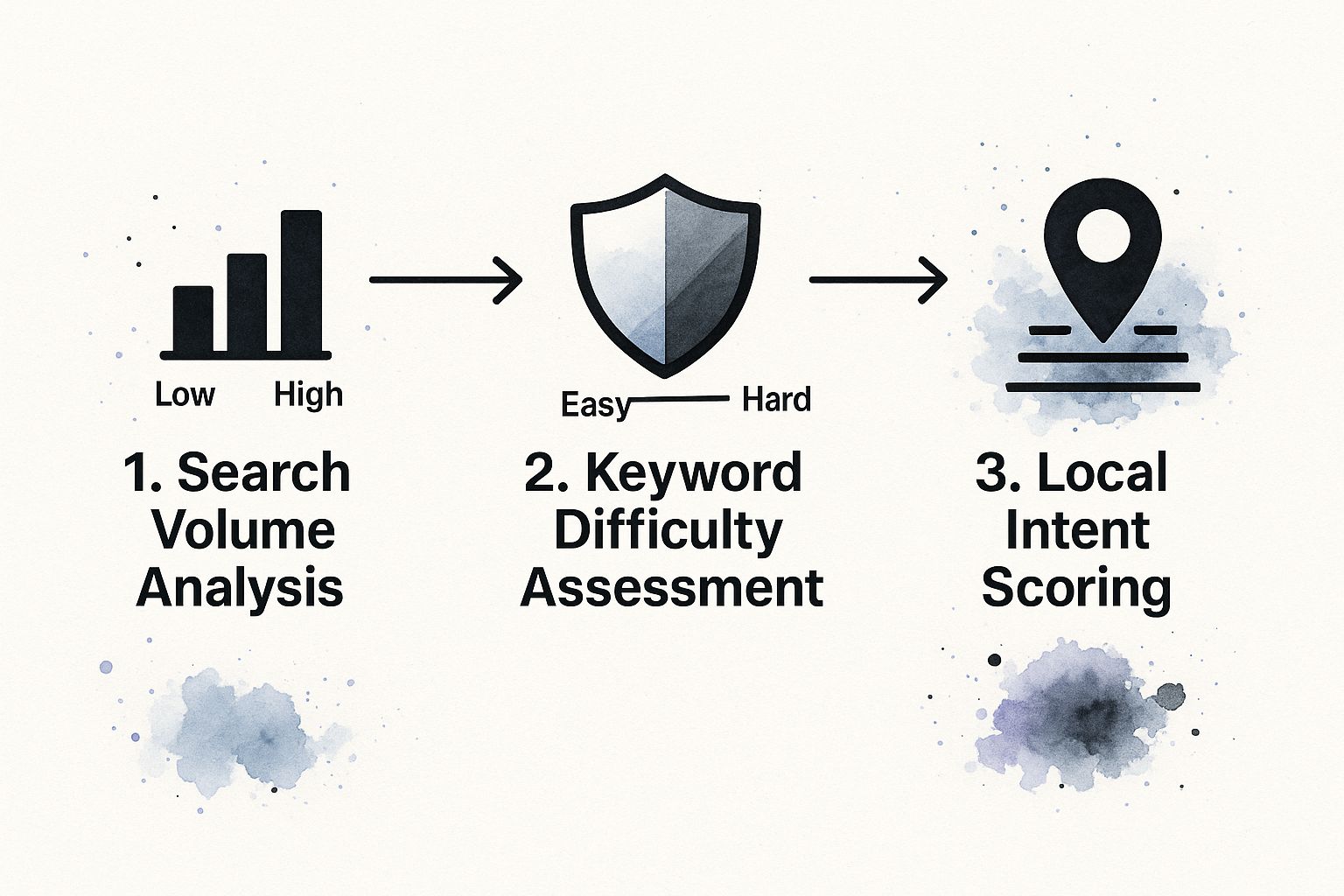Keyword research for local SEO is all about figuring out the exact words and phrases people type into Google when they're looking for products or services in their own backyard.
It’s the difference between someone vaguely searching for information and someone ready to pull out their wallet. Think "emergency plumber in Brooklyn" or "best coffee shop near me". These aren't just searches; they're signals of someone who wants to buy, and they want to buy locally.
Why Local Intent Is Your Secret Weapon in SEO
Let’s be real for a second. Local search isn’t just some small slice of the SEO pie—it’s where your most valuable customers are hanging out.
The whole mindset behind a local search is fundamentally different. When someone types "plumbing tips" into Google, they're in learning mode. Maybe they're curious. But when that same person searches for "24-hour plumber downtown," they’re in problem-solving mode. They have a pipe bursting, and they need to hire someone. Right now.
That distinction is the entire game when it comes to keyword research for local SEO. It’s not about getting the most traffic. It's about getting the right traffic. Nail this, and you'll build a strategy that speaks directly to customers who are actively looking to make a purchase.
The Power of "Near Me" Searches
The explosion of mobile search has totally rewired how people find things. We all expect instant, location-specific results on our phones, and the data backs this up in a big way.
The numbers are pretty staggering. Studies consistently show that nearly half of all Google searches (46%) have local intent. What's even more powerful is that an incredible 78% of local mobile searches result in an offline purchase, often within just 24 hours.
That means the person searching for your service on their phone is highly likely to walk through your door or call you that very same day. If you want to dive deeper into these trends, check out this detailed local SEO analysis to see what it means for businesses.
Key Takeaway: Local searches aren't just casual browsing. They are high-intent queries from potential customers who are just a step away from making a buying decision. Focusing on these terms is the fastest path to turning your online presence into real-world revenue.
Local vs Broad Search Intent Comparison
To really hammer this point home, let's look at the difference in mindset between someone doing a broad search versus a local one. A general query is usually about research. A local query is about getting a solution.
This table breaks it down pretty clearly:
| Search Type | Example Query | Typical User Intent | Conversion Likelihood |
|---|---|---|---|
| Broad Search | "how to fix a clogged drain" | Informational, DIY, learning | Low |
| Local Search | "affordable plumber in Austin TX" | Commercial, urgent need, ready to hire | High |
| Broad Search | "best pizza recipes" | Informational, cooking at home | Very Low |
| Local Search | "pizza delivery near me open now" | Transactional, immediate hunger | Very High |
Seeing it laid out like this makes it obvious why focusing your keyword research for local SEO is so critical. You're not just trying to rank for random terms; you're trying to connect with people at the exact moment they need what you offer. This laser focus on high-intent, location-based keywords is what turns a simple website into a machine for attracting new customers.
Laying the Groundwork: Your Foundational Local Keyword List

Before you get lost in spreadsheets and tools, let's get back to basics. Solid keyword research for local SEO isn't about chasing huge, generic search volumes. It’s about building a rock-solid list of phrases your actual customers are punching into Google right now.
Our first job is to create a "seed list." Think of this as the core group of keywords that perfectly describe what you do and, just as importantly, where you do it.
The simplest, most powerful formula for this is [Service] + [Location]. This is the absolute bread and butter of local search, and it’s where we'll start.
A plumber in Denver isn't just ranking for "plumbing services." They’re getting calls because they show up for "water heater repair in Denver," "emergency plumber Cherry Creek," or "drain cleaning in LoHi." These are the terms people use when a pipe bursts and they need help—fast.
Brainstorming Your Core Service Keywords
First things first: forget about locations for a minute. Your initial task is to list out every single service you offer. I mean everything. Be granular. If you're a roofer, "roofing" is nowhere near specific enough.
You need to think like a customer with a problem. What specific solutions do you provide?
- Emergency roof leak repair
- Asphalt shingle replacement
- Metal roof installation
- Gutter cleaning services
- Commercial flat roof maintenance
Each one of those is a potential seed keyword. Someone who needs a whole new roof uses very different search terms than someone with a small, dripping leak. Capturing these variations is absolutely critical.
Pro Tip: Go talk to your front-line team. Your receptionist, your sales reps, whoever answers the phone. Ask them what exact phrases customers use to describe their problems. This is a goldmine for discovering the natural, high-intent keywords you'd otherwise miss.
Expanding with Keyword Modifiers
Okay, you've got your list of core services. Now it’s time to layer on the "modifiers." These are the extra words and phrases customers use to find exactly what they're looking for.
These modifiers are huge because they reveal the user's motivation. Are they on a tight budget? Is it an emergency? Are they looking for the absolute best?
Common Modifier Categories: * Cost-Related: affordable, cheap, low-cost, pricing, estimate, deals * Urgency-Related: emergency, 24-hour, same-day, fast, quick * Quality/Trust-Related: best, top-rated, certified, licensed, reliable * Intent-Related: near me, nearby, close to, companies, contractors
By combining these, "roof repair" transforms into "affordable roof repair near me" or "best 24-hour emergency roofer." These longer phrases—what we call long-tail keywords—might have less search volume, but their conversion rates are through the roof. The user's intent couldn't be clearer.
Thinking Like a True Local
To really win at local SEO, you have to go beyond just the main city name. You need to think, talk, and search like someone who actually lives there. This means weaving in hyperlocal geographic terms that build incredible trust and relevance.
Start adding these location types to your keyword combinations: * Neighborhoods: "HVAC repair in Lincoln Park" (for Chicago) * Zip Codes: "pizza delivery 90210" (for Beverly Hills) * Nearby Landmarks: "coffee shop near Central Park" (for NYC) * Regional Slang: "water ice near me" (for Philadelphia) instead of "shaved ice"
Putting in the effort to build this comprehensive list gives you a powerful asset that will guide your entire marketing strategy. And if you're looking for more ways to turn these insights into real business growth, you'll find some great strategies over on the RebelGrowth blog. This seed list is the foundation for everything that comes next, from deep data analysis to on-page optimization.
Using SEO Tools for Smarter Local Keyword Research
A brainstormed list is a fantastic starting point, but data is what really separates a good local SEO strategy from a great one. Making the leap from educated guesses to data-driven decisions is how you win in competitive local markets. This is where SEO tools become your most valuable ally in the entire keyword research for local seo process.
These platforms turn your initial seed list into a strategic roadmap. They help you validate your ideas with real-world search volumes, uncover keyword opportunities you never would have thought of, and even peek at what's working for your competitors down the street. It’s the difference between blindly casting a net and using a high-tech fish finder to see exactly where the customers are.
Validating Keywords With Real Data
The first thing you’ll do with any tool is test your assumptions. Let’s say a Chicago pizzeria brainstormed "Chicago deep dish pizza" as a core keyword. A tool like Ahrefs or SEMrush can instantly tell them the monthly search volume for that exact phrase in the Chicago area, plus its keyword difficulty.
This data is gold. You might find that "deep dish pizza near me" actually gets way more searches. Or maybe "best gluten-free pizza Chicago" has lower volume but is far less competitive, making it a perfect target for some quick wins.
I’ve found that dedicated local SEO platforms are especially powerful here. Tools like BrightLocal, alongside staples like SEMrush and Google's Keyword Planner, are what practitioners use to find high-impact phrases that fuse location with intent—think ‘emergency plumber in Brooklyn’ instead of just ‘plumber’. Since 42% of all clicks on local searches go to results in the Google Maps pack, optimizing for keywords that trigger map listings is non-negotiable.
This is a pretty good visual of the core process for analyzing keywords with data.

The flow from analyzing search volume to assessing difficulty and local intent shows a clear path for prioritizing your keyword list.
Uncovering Hidden Keyword Gems
Beyond just validating your own ideas, the real power of these tools is in discovery. Most platforms have a "Keyword Gap" or "Competitor Analysis" feature. You can plug in the website of a successful local competitor and see the exact keywords they are ranking for that you aren't.
This isn't about just copying their strategy; it's about identifying the gaps in yours. You might discover they’re ranking for "pizza delivery River North," a specific neighborhood you hadn't targeted, revealing a whole new customer segment.
Tools like BrightLocal are designed specifically for this, providing clear, actionable data on local search performance.
As local SEO evolves, it's also smart to keep an eye on broader trends. For instance, understanding the impact of topics like artificial intelligence in marketing can provide valuable context for modern strategies. By combining your initial brainstorming with robust data analysis, you can build a keyword list that's not only comprehensive but also highly strategic and ready to deliver results.
Finding the perfect local keywords is a huge win, but they won't do you any good sitting in a spreadsheet. Now comes the critical part: putting them to work. Strategic placement is what tells Google—and your potential customers—that you are the most relevant result for their immediate, location-specific needs.

Effective placement actually starts long before a customer ever lands on your website. Once you've nailed down your target terms, the very first step is making sure they're integrated into your online presence, beginning with listing your business on Google Maps. Think of this as your digital storefront—it's often the first interaction a local searcher has with your brand.
Optimizing Your Google Business Profile
Your Google Business Profile (GBP) is arguably your single most important asset for local SEO. It's not just a listing; it’s a dynamic profile that directly influences how well you show up in the coveted Google Map Pack.
Sprinkle your primary local keywords naturally in these key areas:
- Business Name: If it feels natural and doesn't violate Google's guidelines, consider including your main service and location. For example, “North Austin HVAC Repair” is much stronger than just “Austin HVAC.”
- Business Categories: Be as specific as you can with your primary category. Then, layer in secondary categories that cover all your services. Don't leave anything out.
- Services Section: This is a goldmine. List every single service you offer, using the exact keyword phrases you found in your research. Think “24-hour emergency plumbing” and “tankless water heater installation.”
A complete and verified Google Business Profile can dramatically boost your credibility. Customers are 2.7 times more likely to trust businesses with comprehensive profiles. Plus, verified listings can pull in over 21,000 annual views, which shows the massive exposure you get from smart local keyword targeting.
Weaving Keywords Into Your Website
Your website is where you seal the deal. While your GBP gets you noticed, it’s your site that convinces customers to actually pick up the phone or fill out a form. Every page is a new opportunity to reinforce your local authority.
Start with the on-page SEO fundamentals for your most important pages, like your homepage and core service pages.
Key On-Page Placement Areas:
- Title Tags: This is the blue, clickable link people see in search results. Make it count. A great formula is: Primary Keyword | Brand Name (e.g., “Emergency Roof Repair Dallas | Apex Roofing”).
- Meta Descriptions: While not a direct ranking factor, a compelling description that includes your keyword will absolutely encourage more clicks. Mention your service, location, and a unique benefit.
- H1 Heading: This is your main page headline. It should state the page's purpose clearly and feature your primary keyword (e.g., “Your Trusted Plumber in Scottsdale, AZ”).
- Body Content: Weave your primary and secondary keywords into the text, especially within the first 100 words. The key is to keep it natural—always write for humans first and search engines second.
This process is fundamental for creating high-converting local pages. In fact, getting these on-page elements right is a core principle behind building effective local business landing pages that consistently turn visitors into leads.
For businesses that serve multiple distinct areas, take it a step further by creating dedicated location pages (e.g., yoursite.com/service-in-north-austin). Each page should be uniquely written and optimized for that specific neighborhood or city. Feature local testimonials, project photos from that area, and hyperlocal keywords.
This focused approach sends powerful signals to Google that you are a dominant player in that specific micro-market, turning your website into a true customer magnet.
Advanced Tactics for Outranking Local Competitors

Alright, you've nailed the basics of keyword research for local SEO. Now it's time to get a real competitive advantage. The fastest way to pull ahead of other local businesses is to figure out what’s already working for them—and then do it even better. This means looking past your own ideas and diving headfirst into strategic competitor analysis.
Your secret weapon here is a local keyword gap analysis. Fire up a tool like Ahrefs or SEMrush and plug in the domains of your top three local competitors. The tool will spit out a list of valuable, location-based keywords they rank for that you're completely missing out on.
This isn't about blind copying. It's about uncovering proven, customer-generating terms that are already driving business in your market. For instance, a boutique hotel in Miami might discover its main rival is ranking for "art deco hotels South Beach," a super specific, high-intent phrase they hadn't even considered. That single insight lets them build targeted content and start competing for that traffic almost immediately.
Mine User-Generated Content for Keyword Gold
Your competitors aren't the only place to find keyword intelligence. Your own customers—and your competitors'—are handing you a constant stream of natural, long-tail keywords every day.
Don’t just skim your Google Business Profile reviews and Q&As really analyze them. When customers keep bringing up a specific feature, like a “pet-friendly patio” or “easy street parking,” those are authentic keywords. Start weaving them into your website copy and GBP.
This kind of user-generated content is pure gold because it reflects the exact language people use when they're about to make a decision. You can even peek at the Q&A sections on your competitors' GBP listings to find questions you can answer more thoroughly on your own site.
Using these phrases signals to Google that you are deeply in tune with what local searchers actually care about.
Adopt a Dynamic Approach
A winning local SEO strategy is never "set it and forget it." You have to consistently track your Google Map Pack rankings for your most important keywords. It's a must.
When you notice a competitor suddenly leapfrog you, dig into their profile. What changed? Did they add new services? Are they getting a flood of new reviews that all mention a specific keyword? Staying vigilant like this allows you to react quickly and defend your hard-earned spot.
A truly well-rounded strategy also means optimizing your presence on social media. For example, learning about Instagram keyword research can help you capture a whole different slice of the local audience.
And for businesses wanting to cast a wider net, joining a local business directory provides another powerful signal to search engines. By combining these advanced tactics, you create a dynamic, multi-front approach that keeps you one step ahead of the competition.
Even with the best plan, questions always pop up during the local keyword research process. It happens to everyone. Let's walk through some of the most common ones I hear, so you can move forward with more confidence. Nailing these little details is what separates the sites that get traffic from the ones that get customers.
How Is Local Keyword Research Different from General SEO?
The biggest difference comes down to one word: intent.
General SEO often goes after broad, informational searches like "how to fix a leaky faucet." Someone typing that in could be anywhere in the world. They're usually in research mode, not "I need to hire someone now" mode.
Local keyword research, on the other hand, is all about capturing immediate, location-based needs. Think "emergency plumber in San Diego." We're targeting phrases that scream "I need help, right here, right now." This means we're hunting for keywords with geographic terms (city, neighborhood, even a zip code) and transactional words ("near me," "open now").
The goal isn’t just to show up in the search results; it’s to dominate the Google Local Pack and Map results. These are the money spots, triggered specifically by local intent, and they're proven to drive the phone calls and in-store visits that actually grow a local business.
What Are the Best Free Tools for This?
You can absolutely build a killer local keyword strategy without dropping a single cent on fancy tools. Google’s own tools are a goldmine of free data, as long as you know where to dig.
- Google Search Autocomplete: This is your first stop. Just start typing one of your core services into the search bar. The suggestions that appear are real queries that people are actively searching for. It's a direct line into your customers' minds.
- "People Also Ask" Boxes: As you search, look for these boxes in the results. They're fantastic for uncovering related questions and long-tail keyword ideas you might have missed.
- Your Google Business Profile Insights: This is pure gold. It literally shows you the exact search terms people used to find your business profile. It doesn't get more relevant than that.
While Google Keyword Planner is built for paid ads, you can still get some decent keyword ideas and rough volume estimates from it. Just make sure to filter the results down to your specific service area.
How Many Local Keywords Should I Target?
This is where a lot of people go wrong. It’s all about quality over quantity. Forget trying to rank for hundreds of keywords right out of the gate.
A much smarter approach is to start with a core list of 5-10 high-value keywords. These should be your bread and butter—your main service combined with your main location (e.g., "best personal injury lawyer Houston").
Make these keywords the laser focus for your homepage and your Google Business Profile. Once that foundation is solid, you can start expanding. Create dedicated pages for each of your specific sub-services or the different neighborhoods you serve. Each of those pages can then target another 1-3 primary keywords, plus a handful of related long-tail variations.
This approach builds topical authority methodically, so you're not spreading your efforts too thin. It's how you build a powerful, relevant presence that Google can't ignore.
Ready to stop guessing and start growing? rebelgrowth gives you the AI-powered tools to dominate local search, from generating perfectly optimized blog posts to managing your entire social media presence. Take control of your local visibility by visiting us at https://rebelgrowth.com.
